The Many Faces of Viet Thanh Nguyen
The Vietnamese American writer’s leap to the mainstream comes at a moment that demands his anti-colonialist perspective.
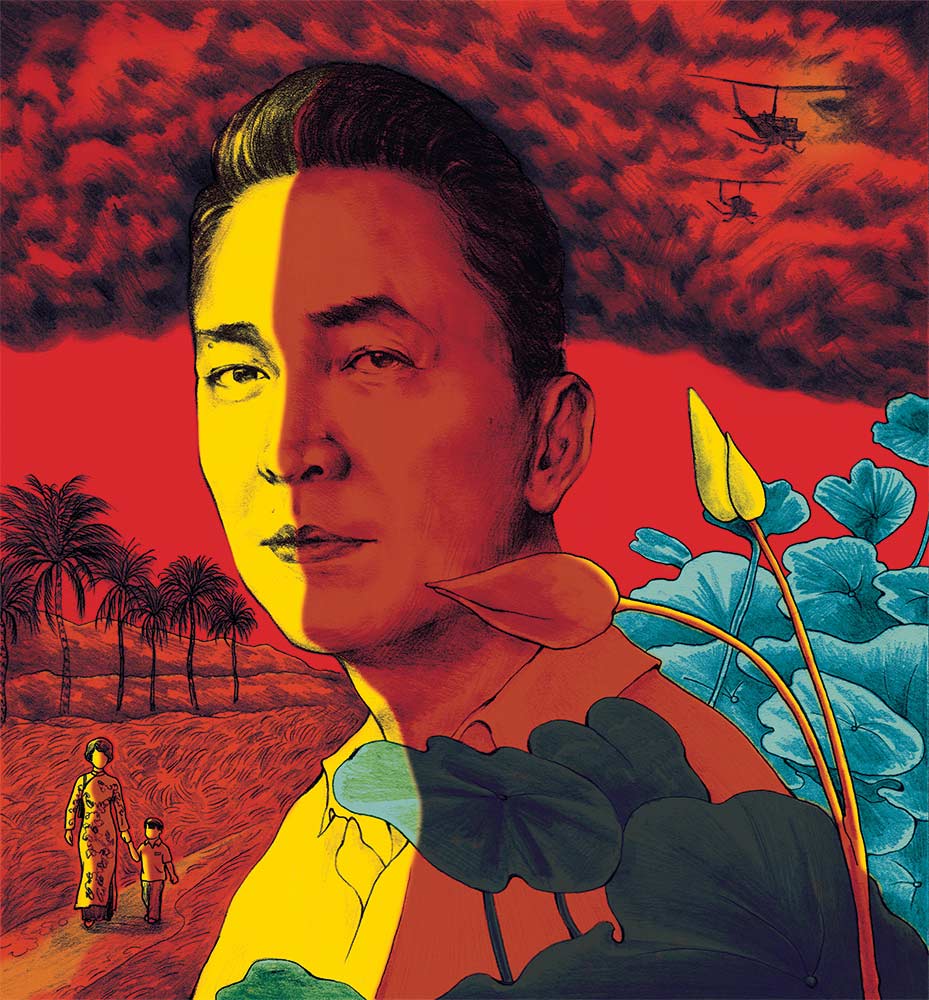
Viet Thanh Nguyen was groaning. He couldn’t help it.
He had already sat through a sermon conducted in a rarefied Vietnamese dialect that he couldn’t understand. The congregation had risen and sat down, risen and sat down. They had beat their breasts to rattle their souls and purify their hearts.
A slight young man with shaggy black hair, Nguyen was nearly indistinguishable from a sea of hundreds of black and gray heads of hair assembled in the packed congregation. The majority of the congregants at St. Patrick’s Church in San Jose, Calif., were refugees, just like his family, who had fled the country at the height of the war in Southeast Asia.
After the priest had left the pulpit, just when it seemed like the service was over, a woman or two in the back would start chanting, and others would soon join in. Nguyen couldn’t leave the church without his parents, who would wait until these seemingly interminable spectacles of piety subsided. So he could only groan.
These days, Nguyen, 53, jokingly refers to himself as “a professional Vietnamese American.” A famous novelist and a professor at the University of Southern California, Nguyen has spent his professional career exploring the afterlife of colonial conquest and war in the Vietnamese diaspora.
Last fall, he began a national book tour for his new memoir, A Man of Two Faces, which follows his family’s history from Vietnam to the United States in a nonsequential narrative filled with meditations on memory, racism, and pop-culture propaganda. The book’s unconventional form, Nguyen says, was intended as a “meta-narrative” that makes explicit that the American dream is “a euphemism for settler colonialism.”
Like Nguyen’s other books, this memoir is critical of the US military-industrial complex. His oppositional stance informs his support of the Boycott, Divestment, and Sanctions movement, and since the outbreak of the Israel-Gaza war, he’s been a vocal advocate for a cease-fire. Two dates on his tour had to be moved to different locations, partly because of his public position on the conflict. The cancellations underlined what his writing has sought to uncover: As Americans, Nguyen says, we’re trained “to think of wars as episodic” rather than as a continuous production of the American war machine and its long history. He’s made it his life’s mission to trace these larger connections until they are impossible to ignore.
Nguyen’s work has made him a celebrated figure in literary circles. Now streaming and cable TV will bring his scathing dissections of American imperialism, wrapped in the enticing package of a spy thriller, to a mass audience. This April, an adaptation of his Pulitzer Prize–winning debut novel, The Sympathizer, will air on HBO. “That’s a feat, as far as I’m concerned,” Nguyen says of making “a seven-part miniseries that is extremely explicit about white supremacy and decolonization.”
Nguyen has been working through these themes all his life, but it took years for them to take shape in his writing and now on the screen. When he was a teenager in San Jose, he felt an “ambivalence” about the narrow contours of life in the Vietnamese American refugee community, with its self-contained social life devoted to work and church. As a “lapsed Catholic,” Nguyen internalized the church’s lessons on guilt and redemption in a secular fashion: “What I took away from the Vietnamese Catholic Church and Catholicism in general was the idea of sacrifice, suffering, collectivism, injustice.” In his worldview, the barbarism of American and French colonialism requires indictment and dismantling, but so does any form of domination.
“Human beings are inherently corrupt,” Nguyen says. But he also believes that we are equally capable of redemption.
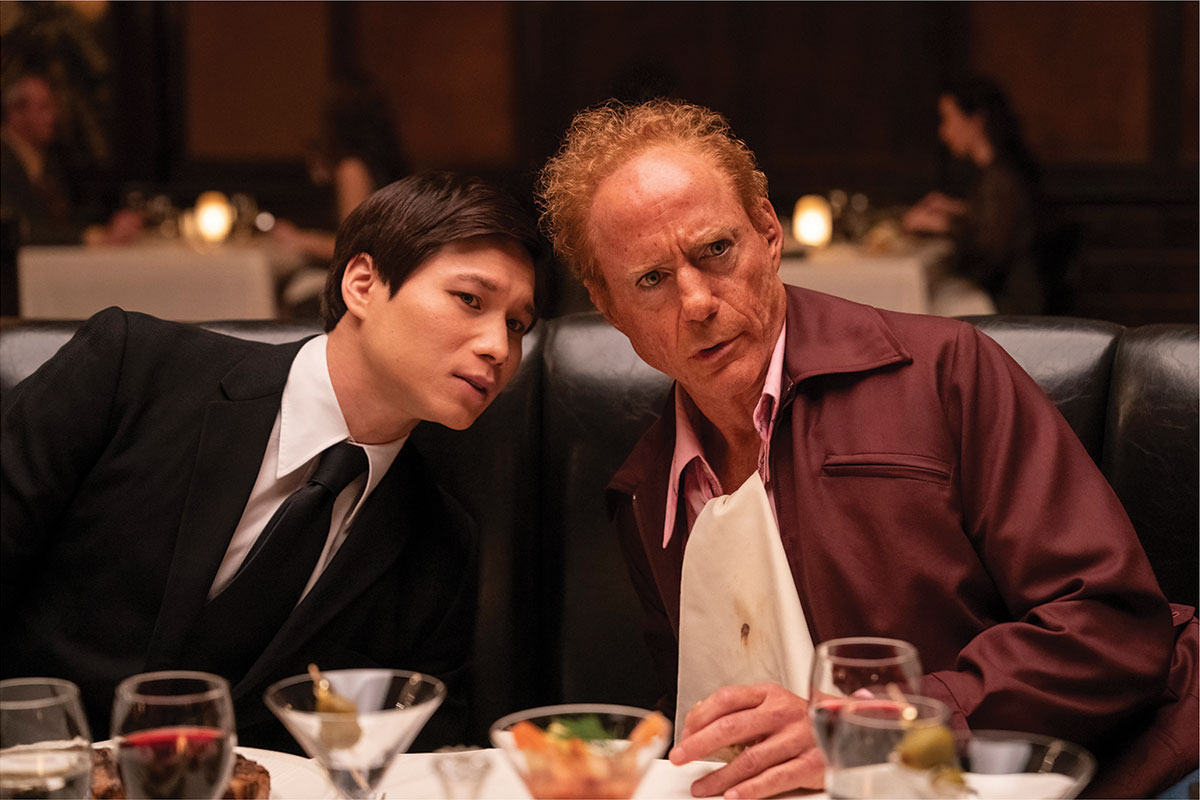
On a rainy, wind-whipped saturday in late September, I meet Nguyen at Manakeesh, a popular Lebanese café near the University of Pennsylvania, noisy with the hissing of coffee steamers and the chatter of West Philly locals.
Before our meeting, his publicist informed me that Nguyen does not eat cheese—the taste of which he associates with a crowded boat out of Saigon 48 years ago, when a man shared milk, likely spoiled, with him and his mother. We order balilah, a swirl of hummus studded with whole chickpeas and served with warm pita, and walnut cookies with our tea. He warns me that he will be checking his phone during lunch to help coordinate field changes for his daughter’s and son’s soccer practices back in Southern California, and laments that he really doesn’t “like the way that youth sports get so competitive.”
As if ready to join a gaggle of overzealous soccer parents on the sidelines, Nguyen is dressed in black track pants, a light green jacket, and a black T-shirt that reads “Make Art.” It’s a casual change-up from the public-intellectual ensemble he wore onstage the previous night: a dapper charcoal suit, with his hair polished into a sweeping arc. He is in town for a panel at the Palestine Writes Literature Festival at Penn, his last speaking engagement before he begins the book tour for A Man of Two Faces.
Nguyen, who was 44 when The Sympathizer was published in 2015, likes to joke about how long it took to write his first book. He spent 20 years figuring out how to write fiction that was “as critical as it was creative.” In that period, he was also working to secure a professorship, immersing himself in the scholarship that now informs his literary work, before trying his hand at the fickle business of writing for a popular audience. The Sympathizer, a high-concept genre novel that blends Cold War noir and postcolonial critique, follows an unnamed “man of two faces,” a half-French, half-Vietnamese communist sympathizer and double agent, from the lead-up to the fall of Saigon to his escape into refugee life in America to his eventual return to Vietnam.
A glowing review in The New York Times hailed the book for filling “a void in the literature, giving voice to the previously voiceless while it compels the rest of us to look at the events of 40 years ago in a new light.” Nguyen responds in his memoir, as he has done elsewhere, with acid humor, quoting Arundhati Roy’s observation that there’s no such thing as “the voiceless,” only the “deliberately silenced” or “preferably unheard.” As he quips in the book, “Vietnamese people are not voiceless! They are really, really loud!”
After The Sympathizer won the 2016 Pulitzer Prize for fiction, Nguyen started to get calls about adapting it for the screen. It took almost five years to sign a deal. In the interim, he began writing even more widely: a collection of short stories (The Refugees); a nonfiction excavation of the Vietnam War and memory (Nothing Ever Dies); a children’s book with his son, Ellison (Chicken of the Sea); and a sequel to The Sympathizer (The Committed). On the heels of A Man of Two Faces, the HBO production of The Sympathizer is finally set to air, helmed by the celebrated South Korean director Park Chan-wook (Oldboy) and featuring an A-list cast, including Sandra Oh, Robert Downey Jr., and the Vietnamese Australian actor Hoa Xuande (Cowboy Bebop) in the lead role.
That the story revolves around Asian American characters during the Vietnam War is one reason, Nguyen surmises, it took so frustratingly long to get an adaptation to the screen. “There are very few roles for white people,” he says. “There’s no white savior. And in my mind, this was always going to be in Vietnamese. I had to find the right people who would do that.”
Nguyen’s books and essays often ripple with anger and sarcasm, but in person he is exceedingly polite, saving any zingers for his writing and public speaking engagements. “To the extent that I’m like the Sympathizer, I’m certainly a very nice Asian American person—always agreeable, hiding my own thoughts,” he says. “I think of it as being strategic.”
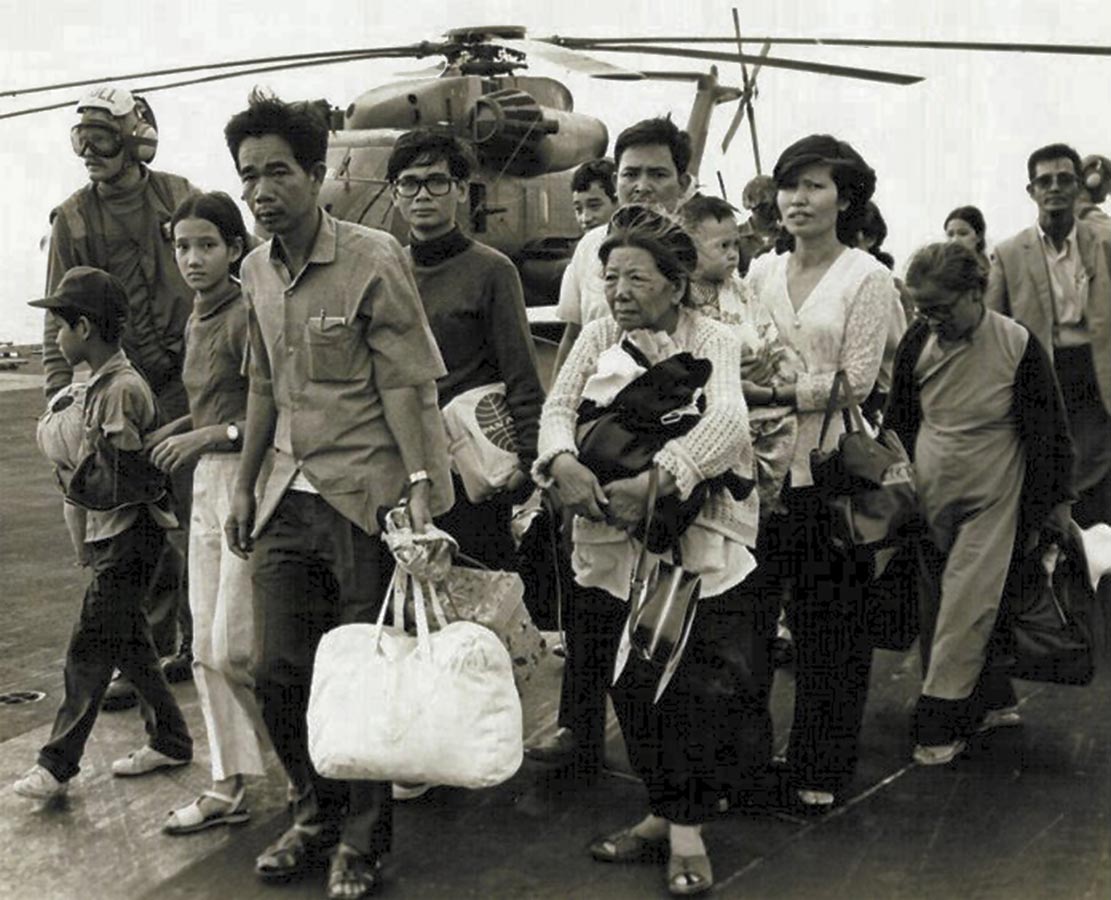
In the third grade, Nguyen won a prize at his local library for his first original work, Lester the Cat. His parents worked 12 to 14 hours almost every day at their grocery store, Sàigòn Mới (New Saigon), so a school librarian took him to accept the award and treated him to a burger afterward. The celebration felt special and fancy to Nguyen, and he later gave the book as a keepsake to a high school girlfriend. But he never told his parents about the prize. (He didn’t tell them about his Pulitzer, either; his father found out when family members called him to offer their congratulations.)
“The store overshadowed everything,” Nguyen says. “The book just seemed very trivial in comparison to the life of the store.”
His parents, Nguyễn Thị Bảy (Linda) and Nguyễn Ngọc Thanh (Joseph), opened Sàigòn Mới after moving to San Jose from Harrisburg, Penn., in 1978. They took only three days off each year (Christmas, Easter, and Tết), saving enough money to pay for Nguyen to attend a private high school and later to make part of the down payment on his first home and fund their own retirement. But as a child, Nguyen didn’t understand that: “I hated the store because it took my parents away from me.”
Nguyen’s parents had run a store in Vietnam before the war, so opening one in San Jose, instead of working at a typewriter assembly factory as his father had done in Pennsylvania, was a natural move. In Vietnam, they also had the advantage, as Nguyen points out in his memoir, of being born to the “right” ethnic and social group. In the 1950s, under the US-supported Catholic Vietnamese president Ngô Đình Diệm, his parents, who had grown up in the north, were given a piece of land in the southern city of Đà Lạt. It was part of an effort to move 800,000 Vietnamese Catholics and Kinh to the Central Highlands to colonize the Indigenous Montagnards. The Nguyens sold that parcel of land, and then another, and eventually opened a successful shop selling everything from jewelry to auto parts. On February 13, 1971, Nguyen was born in Ban Mê Thuột.
Nguyen was too young to remember what his older brother Tùng saw on their escape from Vietnam: the dead paratroopers swinging in trees. He was only 4 when, on the day before Saigon fell in 1975, the family jumped on a boat in a mad scramble to leave the country. They first landed at refugee camps at military bases in the Philippines and Guam before reaching the US, where they lived in another refugee camp on yet another military base, in Fort Indiantown Gap, Pa. They moved to Harrisburg after getting out of the refugee camp and lived in Pennsylvania for three years before moving to San Jose, which, as Nguyen notes in his memoir, had more of their fellow countrymen, more opportunities, and more sunshine. Today, it has one of the largest Vietnamese populations outside of Vietnam.
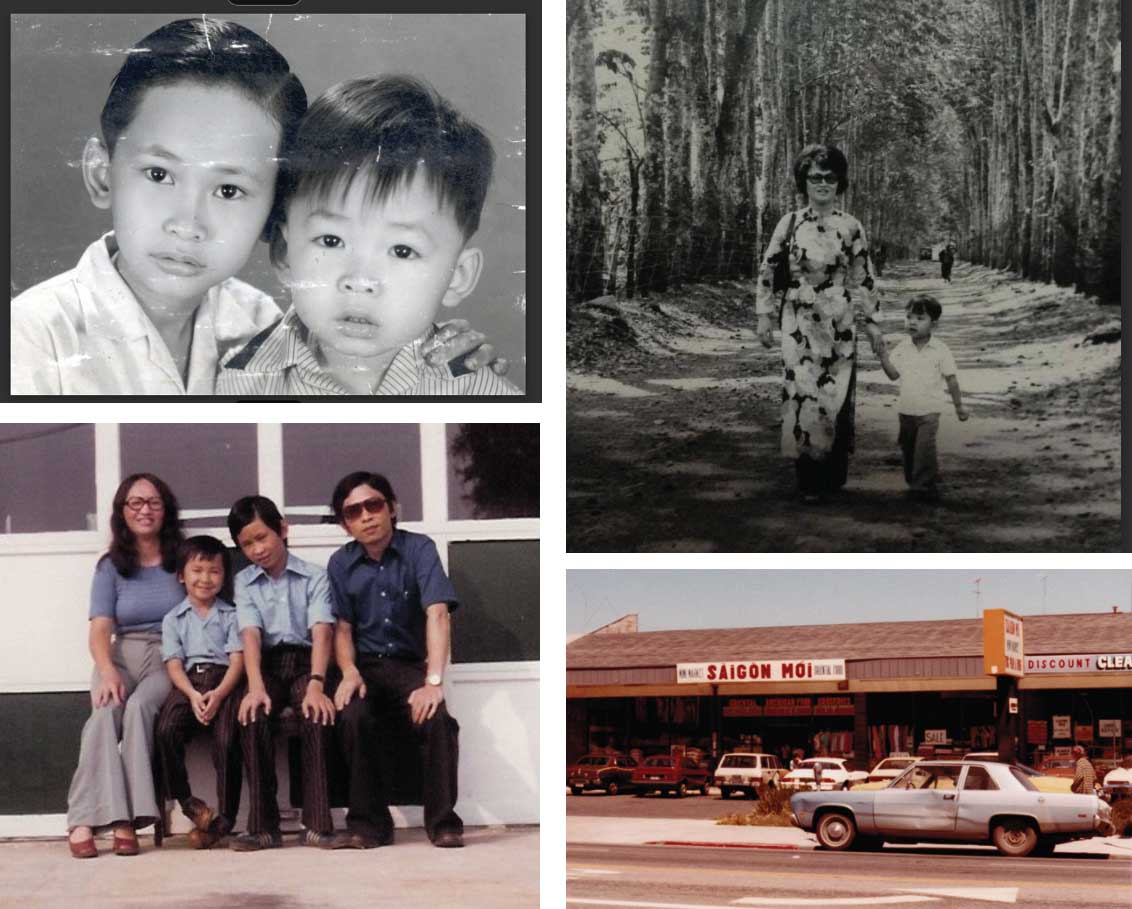
Tùng says Nguyen started “fighting against everything that was Vietnamese,” including their Vietnamese language school, their church, and their deeply devout and conservative parents. Nguyen used to get into arguments that would make his father so mad that he would chase his son around their house until Nguyen locked himself in the bathroom.
When Tùng left for college, an 11-year-old Nguyen burst into tears, accusing him of abandonment. His older brother was not only his protector—once chasing down some kids who stole his Halloween candy—but also the family translator and mediator. “My dad didn’t speak English well enough, and my brother didn’t speak Vietnamese well enough, so they were talking to each other through me,” Tùng says.
Popular
“swipe left below to view more authors”Swipe →Nguyen got glimpses of a different kind of American life on television (The Brady Bunch, Leave It to Beaver), at the public library, and later at an elite Catholic prep school, where he was exposed to everything from The Communist Manifesto to high school students driving BMWs. From an early age, the library served as his daycare and community center while his parents were working, albeit one with less supervision. There he discovered Philip Roth and caught a peek of The Joy of Sex in the how-to section. In the second-floor history section, he had his first “encounters with us as The Other” while reading books about the Vietnam War—all written from the perspective of white soldiers.
In search of ways to push boundaries, Nguyen tried out American indulgences and rebellions, too. In his first years of college, he ran up a credit card debt shopping at Banana Republic and doing “stupid stuff” like taking a girlfriend to a bed-and-breakfast in Mendocino. Even before then, as a kid he shoplifted from the local grocery store. For an eighth-grade book report on religion, he tried to take home part of the World Book Encyclopedia (the “R” volume), which couldn’t be checked out from the library, and got caught by a security guard. A police cruiser delivered him to his stunned parents at their store.
“I had a record. I had to go to juvenile delinquent court. And my parents—they were so mad,” Nguyen says with a laugh. “It was a nerdy crime.”
Two weeks after I had breakfast with Nguyen in Philadelphia, Hamas, along with other Palestinian armed groups, stormed into Israel’s border communities, killing 1,200 people and kidnapping 240—the deadliest attack in the nation’s history. Israel responded with cataclysmic military force. Prime Minister Benjamin Netanyahu vowed to raze Gaza, while high-ranking officials in his government referred to the Palestinians living there as “human animals,” among other dehumanizing terms, in a campaign of genocidal rhetoric echoed by Israeli soldiers on social media.
Nguyen’s panel at the Palestine Writes Festival was called “The Cost, Rewards, and Urgency of Friendship” and also featured the British journalist Gary Younge and Roger Waters of Pink Floyd fame. Nguyen’s fellow panelists were forced to join by videoconference. Waters said that campus police told him not to come to the campus, as his invitation had drawn considerable protest for his purported history of promoting antisemitic tropes, while Younge was surprised to learn that his visa waiver to the US had been mysteriously revoked the day before his flight to Philadelphia.
During the Q&A session, one young woman, a Palestinian American, asked Nguyen about her own culpability: How could she oppose Israel’s settler violence while living in a country that had violently displaced Native Americans?
Nguyen recounted his own efforts to untangle this contradiction. Quoting Susan Sontag, he said victims want to feel their pain is unique, but that the challenge instead is to practice a “capacious grief”: the idea that one must transcend the particular pains and injustices of one’s own people to find empathy for those of others.
He elaborated on this idea during our conversation after the panel. “The work of dominant ideologies is to prevent people from seeing how their particular situation might in some way be related to somebody else. If people can’t see these connections, they’re trapped in their singular sorrows,” he says. “That’s not politically productive. But if you connect the singular sorrows, that becomes ever more radical.”
The furor over the literary festival, with donors threatening to pull funds from the university, turned out to be a sign of things to come. In the ensuing months, vicious debates—often sorely lacking in capacious grief—raged. After a congressional hearing about pro-Palestinian activism on their campuses, the presidents of Penn and Harvard were forced out of their jobs. And Nguyen—after signing, along with 750 other artists, an open letter in the London Review of Books that called for a cease-fire in Gaza—was disinvited from scheduled talks on his book tour at 92NY in Manhattan and Congregation Emanu El in Houston.
Still, Nguyen hasn’t shied away from speaking out. “I don’t think very many American citizens would think that [US] settler colonialism could be rolled back—it’s a done deal in terms of history,” Nguyen says of the intensity of the backlash on the issue. “Whereas with Israel-Palestine, it’s not. It’s a live one. We have generations that still remember 1948.”
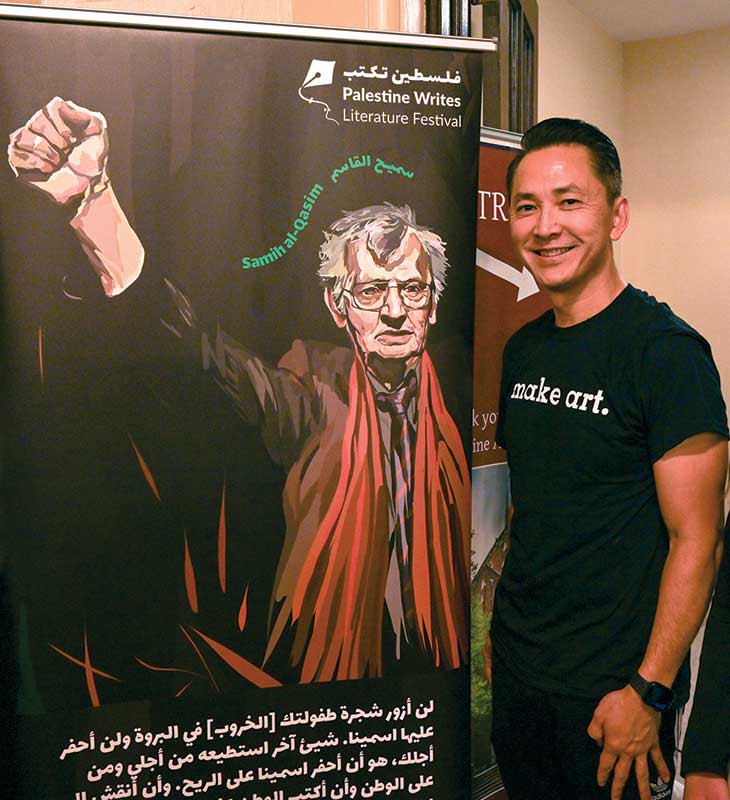
“Viet’s been telling people that he fell asleep in my class,” Maxine Hong Kingston tells me over the phone before I can ask her a question about her former student. “And also I think he had the worst grade.”
A titan in Asian American literature, Kingston taught at the University of California, Berkeley, when Nguyen was a student there in the early ’90s. He earned a seat in her 14-student nonfiction writing seminar with an essay called “Growing Up in White America.” It seemingly would have been a dream class for him.
When Nguyen started college, at the University of California, Riverside, he took a Chicano studies class to fulfill an ethnic studies requirement, which proved “revelatory” as his first exposure to American history “told from a not-white perspective that challenged Manifest Destiny.” By the time he transferred to Berkeley, he had been “reborn as an Asian American at 19.” He pursued Asian American studies and campus activism, taking a class in his first semester with Ronald Takaki, who had just published Strangers From a Different Shore: A History of Asian Americans. Nguyen remembers him delivering “mesmerizing” lectures.
Equally enthralling were the discussions with his fellow Asian American and Pacific Islander students, who impressed him with their knowledge of AAPI history and activism. Dovetailing with the campus anti-apartheid movement of the ’80s, student groups at Berkeley were demanding the diversification of the curriculum and of tenured faculty. Nguyen participated in sit-ins at the administrative offices and a storming of the chancellor’s office. He was arrested twice and charged with four misdemeanor counts of resisting arrest and trespassing.
For all of his activism in Asian American causes, though, he couldn’t meet the basic requirements in a class taught by one of the country’s most prominent Asian American authors. Kingston’s theory of writing was “that all you have to do is write a lot, and the quality of the writing will improve.” She gave her students a simple assignment of writing 50 pages about anything. Nguyen wrote about 40 pages, slept a lot, and didn’t participate in workshopping his classmates’ writing.
“At the end of the semester, I wrote him a letter and recommended that he get some psychotherapy,” Kingston says. “I told him that the university has very good psychiatric help for students. But he never did it.”
When I call Nguyen in early November, he and his wife, Lan Duong (a USC professor who’s a fellow “book-loving misfit”), their 10-year-old son Ellison, and their 4-year-old daughter Simone were about to put on Addams Family costumes for their annual Halloween photo. “As soon as I’m done with our call, I gotta get dressed up as Gomez,” he tells me. Becoming a father, which he initially resisted out of fear that he wasn’t up to the task, proved to be personally edifying, but he also found that “confronting those emotions” as a writer gave him a deeper psychological terrain in his work.
“I think it took a long time for me to investigate myself—to think about the impact of war and the refugee experience on me,” says Nguyen of his decision to become a parent later in life. “I was protecting myself by withdrawing emotionally.”
Last year, Nguyen sent Kingston his newly published memoir. On the flyleaf, he wrote: “For Maxine. It only took 32 years, but I finished the story I started in your class at Berkeley.” Kingston was thrilled. She had previously read an op-ed he wrote for The New York Times that criticized writing workshops—the method Kingston used in her class—for focusing too much on aesthetics and neglecting politics, history, and theory. “It did make me feel bad. I took it personally,” she says, adding that she understands the workshop method “is not for everybody.” She also surmised that it was through Berkeley’s Asian American studies program—which had more of a political focus than the English department did—that Nguyen “found his Vietnamese American identity, and that gave him some substance to write about.”
But her class clearly had an impact on Nguyen, and elements of it have appeared in his work. Nothing Ever Dies, his first nonfiction book, navigates the “ethics of remembering” and the “industries of memory,” as Nguyen has put it. The title was a rejoinder to a book assigned in Kingston’s class: William Carlos Williams’s In the American Grain. She recounts a passage in which Williams excavates the horrors of the genocide of Native Americans and then asks whether we get over history, whether things ever die. “I think Viet was listening to Williams and answering, saying that, yes, the Vietnam War is not over,” Kingston says. “He questions our wars, especially the one in Vietnam, and the reverberating consequences that we go through. And I just love that he answered Williams: ‘Nothing ever dies.’”
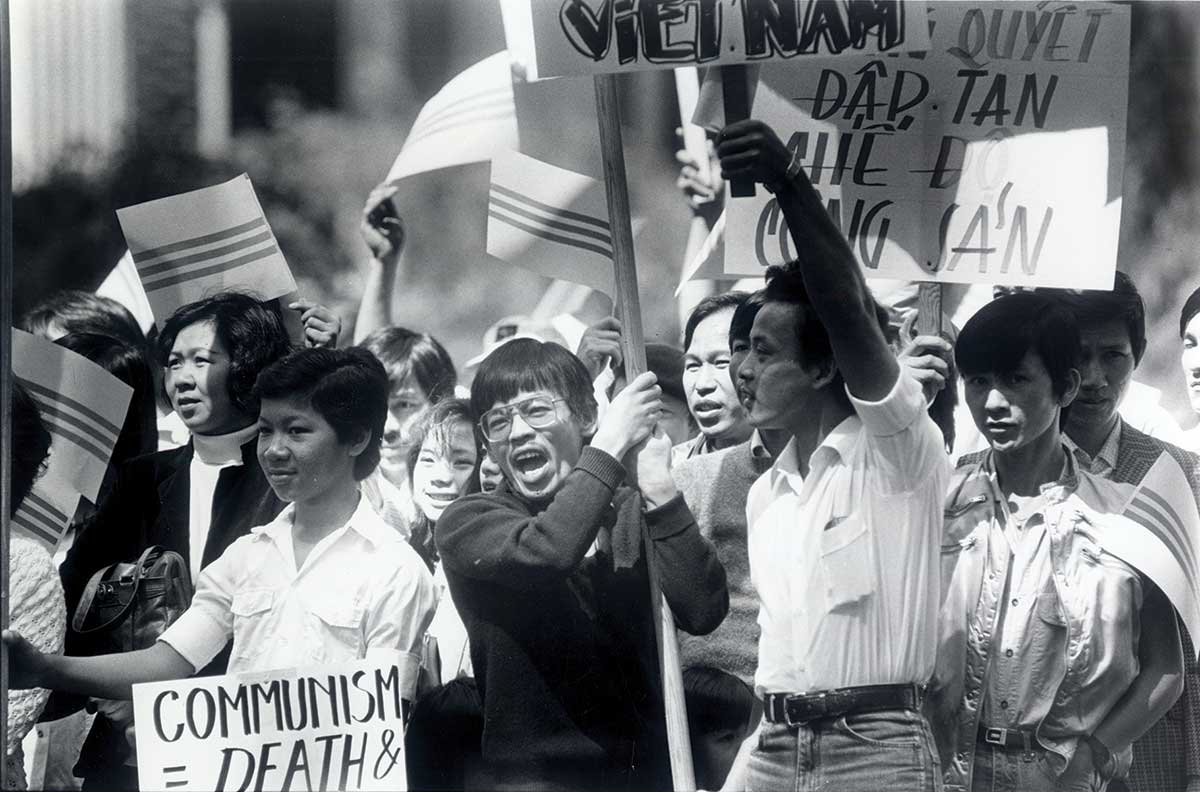
After he left home, Nguyen attended church only when he visited his family. He never told his parents that he had lost his faith, or never really had it to begin with. More than three decades later, though, he felt a wave of inarticulate emotion at his father-in-law’s funeral while listening to the congregation chanting and praying for him—“the very sound of Vietnamese mourning.” Of his relationship with Catholicism, he says: “The stories that I was raised on, the Bible of Jesus Christ—all those things, I think, have been warped in some ways by organized religion. But I have deeply internalized those values and made them my own.”
Church was one of the few spaces where Nguyen could spend time with his hardworking parents when he was young, and where they could attempt to transmit their values to their sons. As his strict and unemotional father aged, he softened and became more conversational, unsparing in saying “I love you” to his grandchildren. But, Tùng says, “We never got that with our mom.”
In the last 13 years of Nguyen’s mother’s life, before she died in 2018, she slipped away from reality. “They never could get a right diagnosis with her—we had all kinds of psychiatrists,” Tùng says. It could have been major depression with psychotic features, bipolar disorder, or, perhaps, the most rational response to the ravages of war.
When I ask Nguyen if there were things about her life he wished he’d asked his mother earlier, he says, “To have that conversation with my mother, my Vietnamese had to be a lot better.” From a young age, Nguyen had committed himself to a serious study of English—an acknowledgment that it was “more important to me than the language that was close to my parents.” It was a common sacrifice, he says, for writers of his kind—immigrants, refugees, people of color.
“Writing is a form of our expression, but it’s also, for some of us, a form of our alienation as well,” Nguyen says. “That was the price that I paid.”
More from The Nation

Celebrations in Syria May Be Premature Celebrations in Syria May Be Premature
The speed of the Assad dictatorship's collapse stunned even the opposition. But the result is a power vacuum that Israel and Turkey have already moved to occupy.

The Fall of Syria Changes Everything The Fall of Syria Changes Everything
Retired diplomat Chas Freeman and writer Pascal Lottaz discuss what happens now that Damascus is in the hands of Hayat Tahrir al-Sham.

Netanyahu Must Be Brought to Justice. But We Can’t Stop There. Netanyahu Must Be Brought to Justice. But We Can’t Stop There.
This genocide is a massive criminal undertaking, and we must hold as many of its perpetrators accountable as we can.

My Brother, Chef Mahmoud Almadhoun, Died Because He Fed Gaza’s Starving Citizens My Brother, Chef Mahmoud Almadhoun, Died Because He Fed Gaza’s Starving Citizens
His killing by Israel sent a chilling message that no one is safe, including humanitarians who stand in the way of Gaza’s erasure.

The Underground Network Helping Gazan Refugees Survive in Egypt The Underground Network Helping Gazan Refugees Survive in Egypt
A patchwork of volunteer-run mutual aid organizations has sprung up to tackle the severe problems facing people fleeing genocide.

The Dangers of Trump’s Foreign Policy The Dangers of Trump’s Foreign Policy
Strategic incoherence and factionalism reign.


